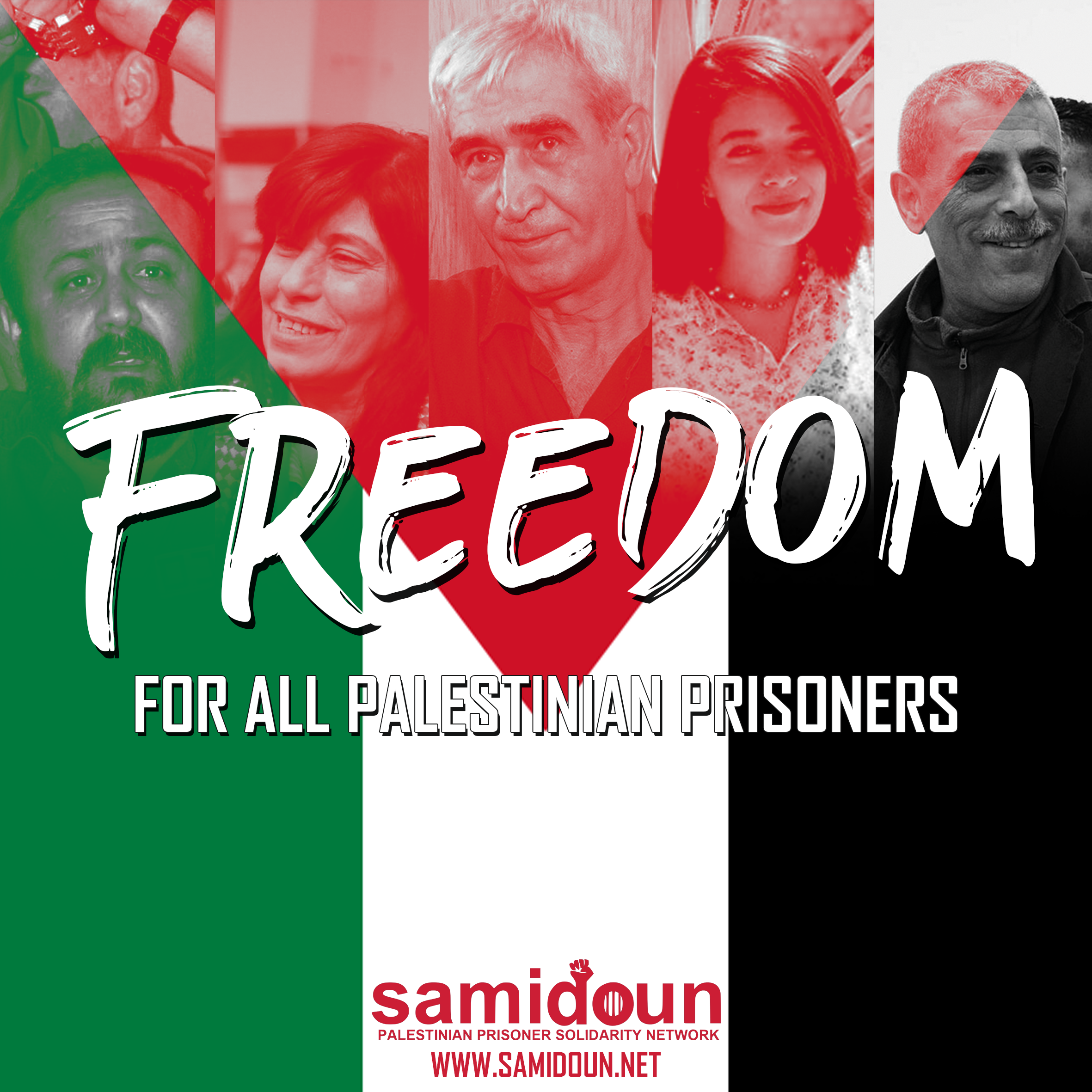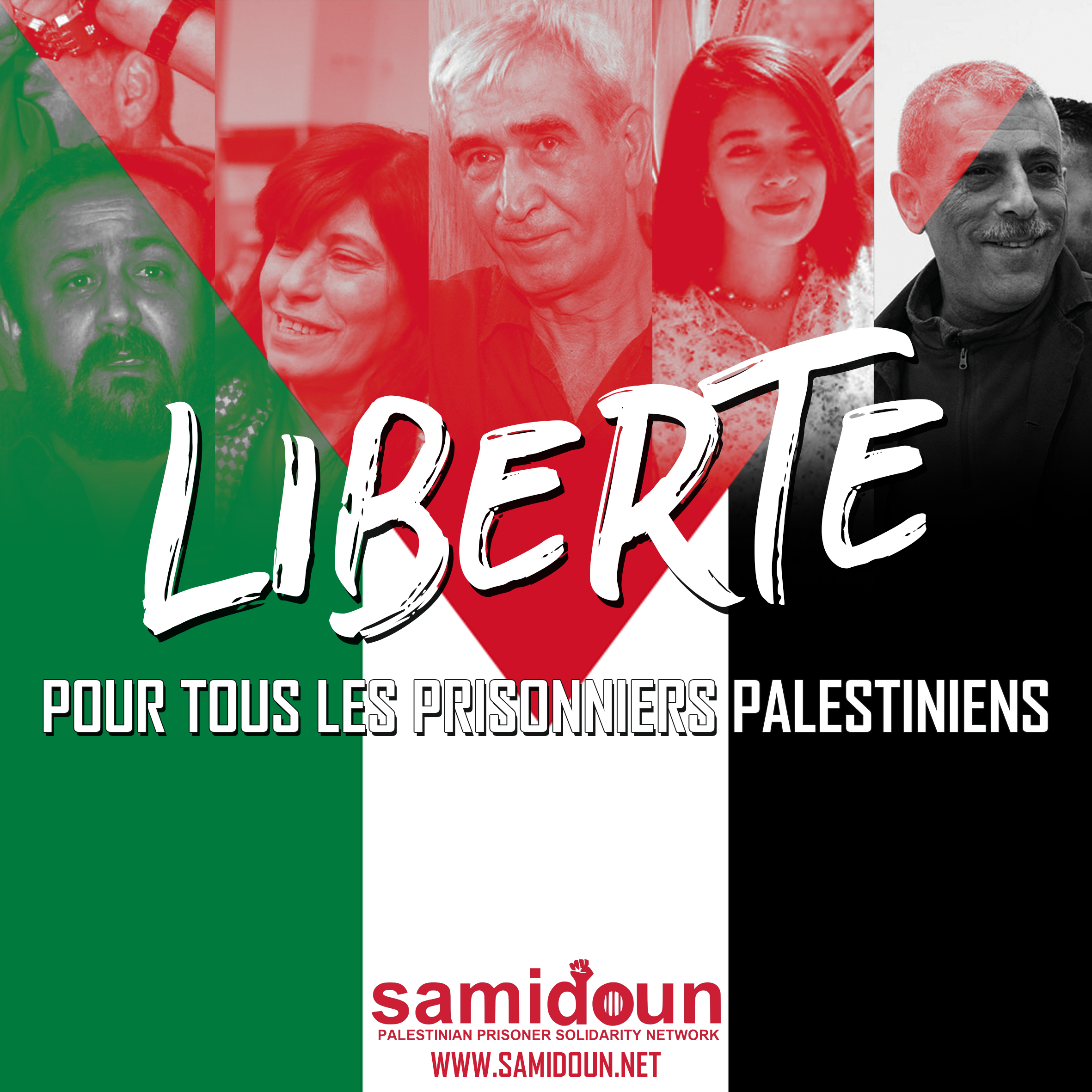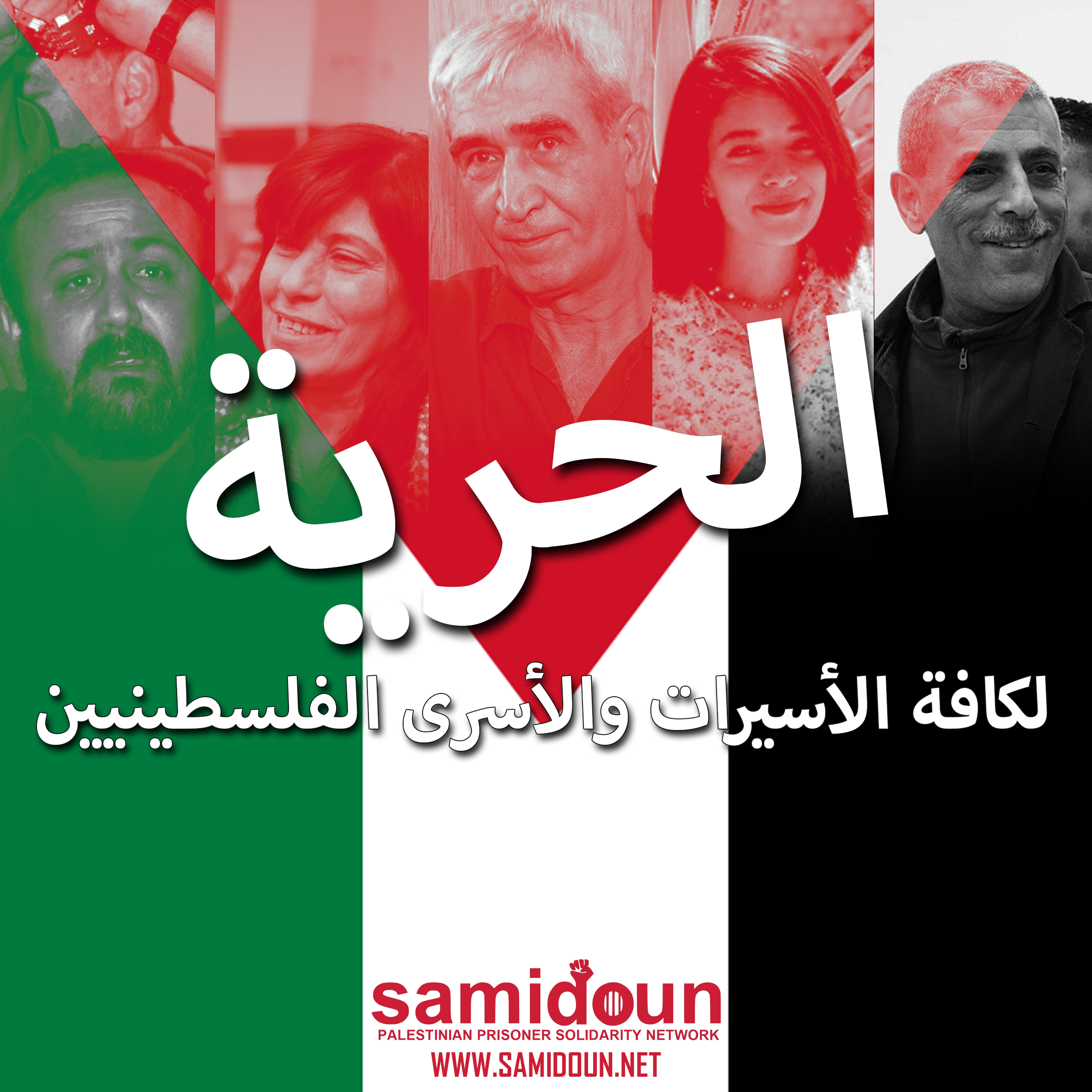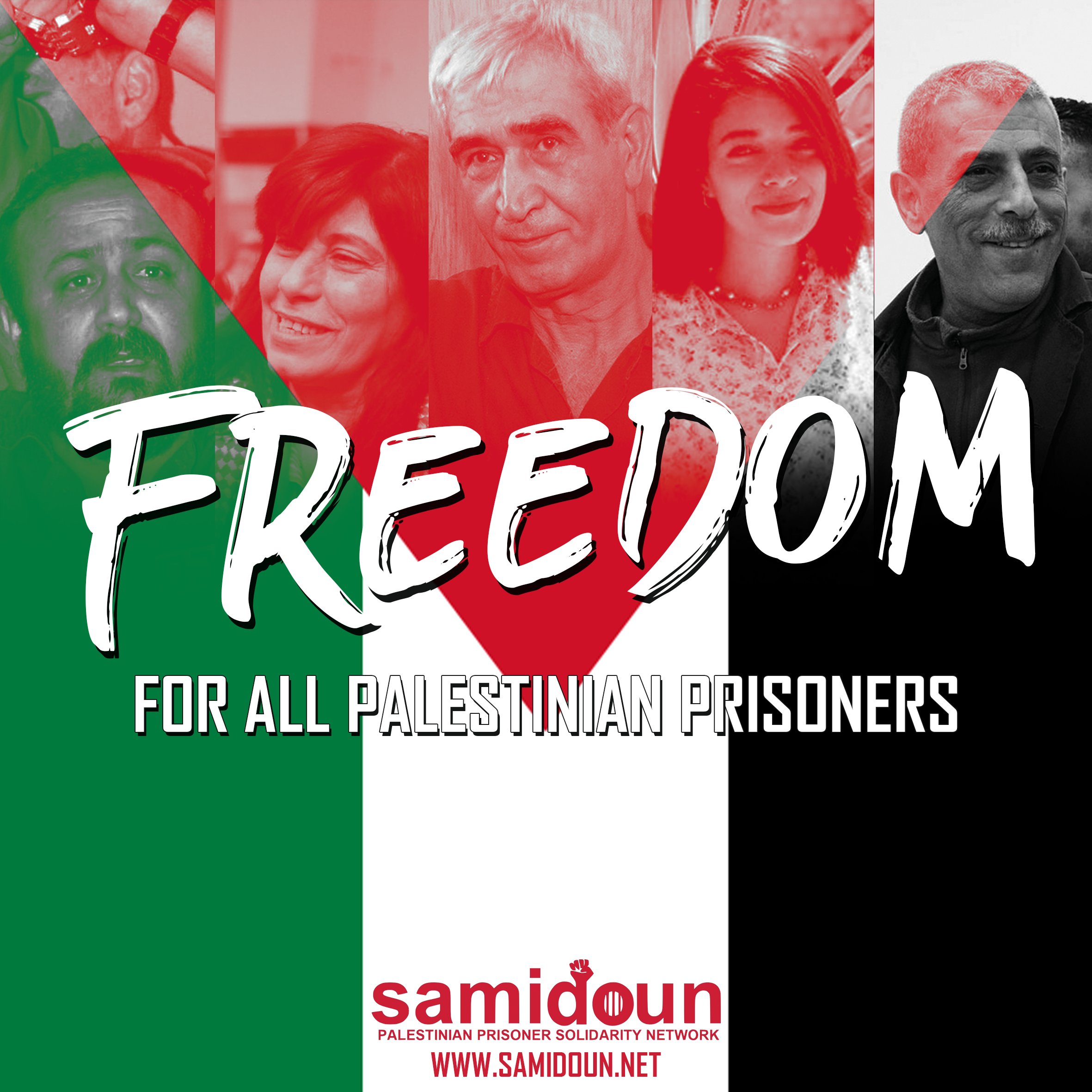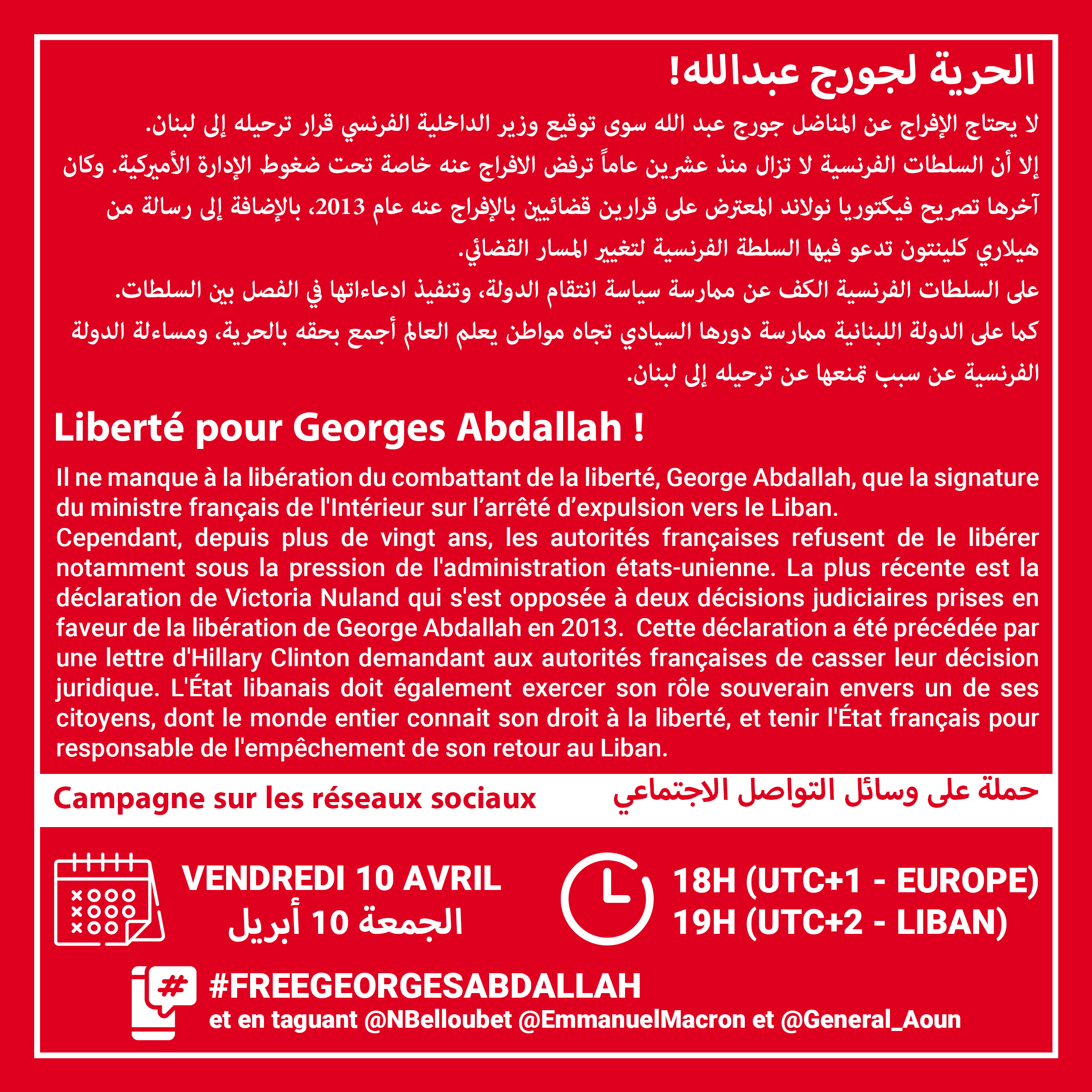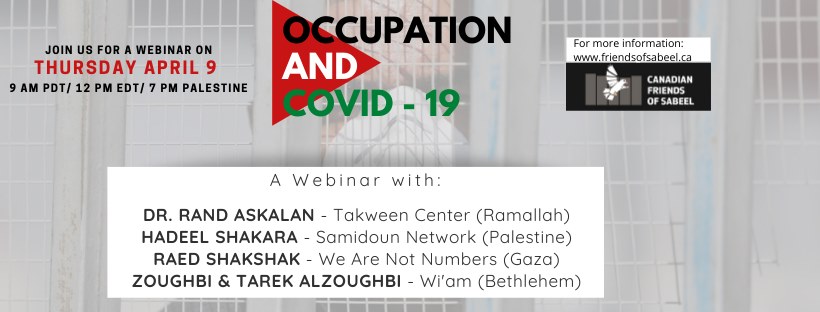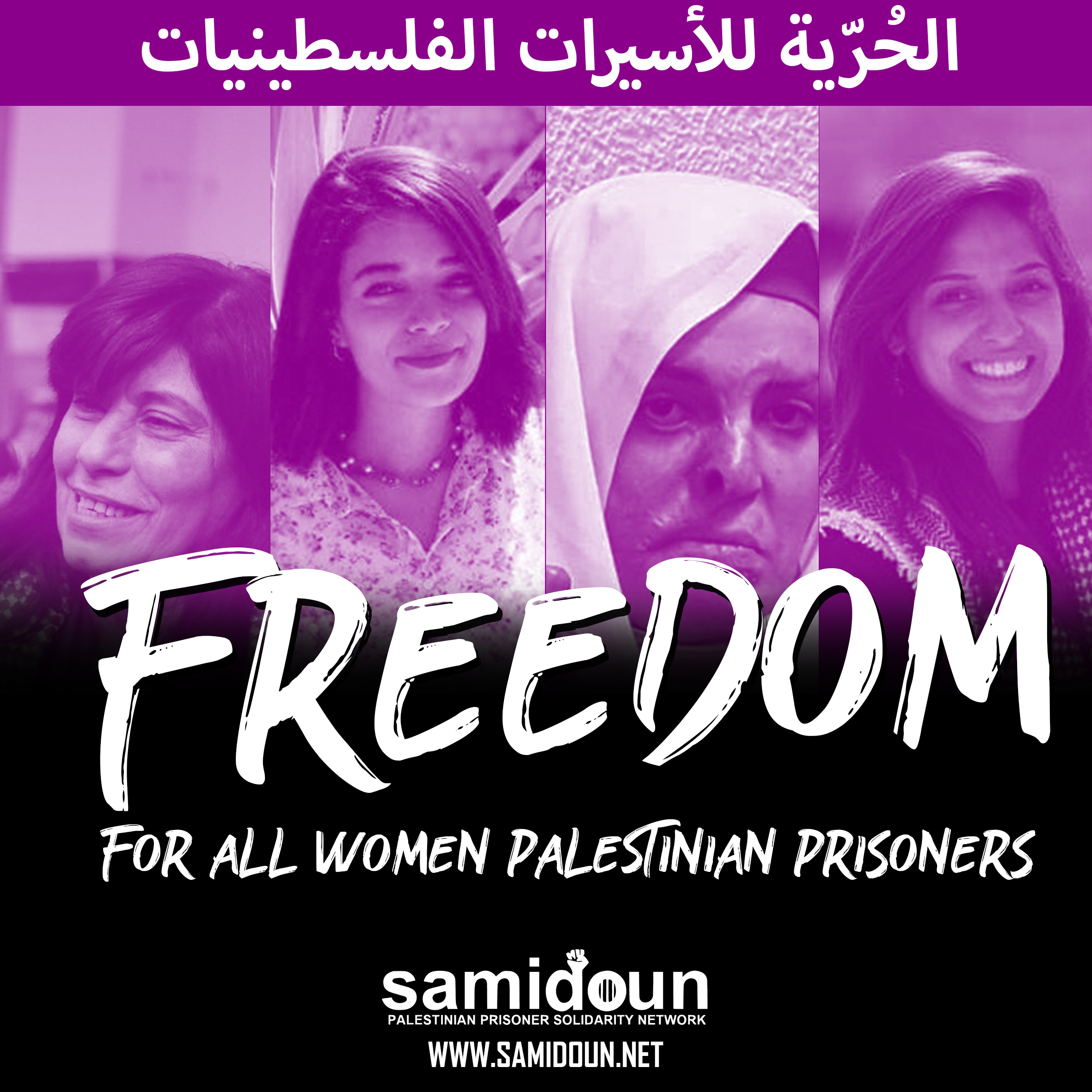
Today, there are 43 imprisoned Palestinian women and girls in Israeli jails. Many of them suffer from health issues, and the global pandemic of COVID-19 poses a significant threat, especially as they are held under harsh condition at Damon prison, previously a stable for animals. Palestinian women behind Israeli bars represent all facets of Palestinian society: parliamentarians, leaders, journalists, social workers, activists, students, mothers, sisters, daughters, aunts, caregivers, health workers and many more.
Throughout the history of the Palestinian cause, Palestinian women have been at the center of the liberation movement in all aspects of struggle and have played a particularly meaningful role in the prisoners’ movement behind bars historically, leading hunger strikes and continuing the struggle for freedom. Samidoun Palestinian Prisoner Solidarity Movement salutes the leading role of Palestinian women in the struggle and urges the immediate release of all Palestinian prisoners in Israeli jails.
- Amal Taqatqa– from Beit Fajjar (Bethlehem), sentenced to seven years
- Israa Jaabis – from occupied Jerusalem, severely wounded; sentenced to 11 years
- Helwa Hamamreh – from Husan (Bethlehem), sentenced to six years
- Nisreen Hasan – from Haifa, occupied Palestine ’48, sentenced to six years
- Sabreen Zbeedat – from Sakhnin, occupied Palestine ’48, sentenced to 50 months
- Maysoun Musa Jabali – from Shawahreh (Bethlehem), sentenced to 15 years
- Rawan Abu Ziyada – from Ramallah, sentenced to nine years
- Shorouq Dwayyat – from occupied Jerusalem, sentenced to 16 years
- Marah Bakir – from occupied Jerusalem, sentenced to 8.5 years (at the age of 16)
- Nurhan Awad – from Qalandiya refugee camp, sentenced to 10 years
- Fadwa Hamadeh – from occupied Jerusalem, sentenced to 10 years
- Malak Suleiman – from occupied Jerusalem, sentenced to 10 years (at the age of 17)
- Wafa Mahdawi – from Alshweika (Tulkarem), sentenced to 18 months (mother of Ashraf Na’alwa)
- Ansam Shawahneh – from Qalqilya, sentenced to five years
- Shatila Abu Ayyad – from 1948 occupied Palestine, sentenced to 16 years
- Ayat Mahfouz – from al-Khalil, sentenced to five years
- Amani al-Hashim – from occupied Jerusalem, sentenced to 10 years
- Jihan Hashima – from occupied Jerusalem, sentenced to four years
- Asiya Kaabneh – from Duma (Nablus), sentenced to 43 months
- Amina Odeh – from occupied Jerusalem, sentenced to 33 months
- Fawzieh Hamad Qandil – from Ramallah, sentenced to 20 months
- Balsam Sharaeh – from al-Lydd, occupied Palestine ’48, detained awaiting trial
- Bayan Faraoun – from occupied Jerusalem, sentenced to 40 months
- Rawan Anbar – from Ramallah, sentenced to three years
- Aisha al-Afghani – from occupied Jerusalem, sentenced to 15 years
- Tasneem al-Assad – from Lakia, occupied Palestine ’48, sentenced to 5 years
- Rahmeh al-Assad – from Lakia, occupied Palestine ’48, sentenced to 4.5 years
- Samar Abu Thaher – from Gaza, sentenced to 2.5 years
- Ranwa Shinawi – from occupied Palestine ’48, detained waiting for trial
- Shorouq al-Badan – held without charge or trial under administrative detention
- Inas Asafreh – from al-Khalil, detained awaiting trial
- Mays Abu Ghosh – from Qalandiya refugee camp, detained waiting for trial
- Samah Jaradat – from Ramallah, detained awaiting trial
- Khalida Jarrar – from Ramallah, detained awaiting trial
- Shatha Hassan – Bir Zeit student council president, held without charge or trial under administrative detention
- Bushra al-Tawil – Palestinian journalist from Ramallah, held without charge or trial under administrative detention
- Rawan al-Samhan – from al-Khalil, sentenced to 18 months
- Azhar Qasem – from Qalqilya, detained awaiting trial
- Suheir Salimiyeh – from al-Khalil, detained awaiting trial
- Suzan Moubayed – from occupied Jerusalem, detained awaiting trial
- Halimeh Khandaqji – from Ramallah, detained awaiting trial
- Nawal Fetheya – from occupied Jerusalem, detained awaiting trial
- Aya Khatib – from occupied Palestine ’48, detained awaiting trial
Below, we are reprinting this article by Samidoun’s international coordinator, Charlotte Kates. It was originally published for International Women’s Day at the International Review of Contemporary Law, the publication of the International Association of Democratic Lawyers. See online in French here.
Steadfastness and resistance: Palestinian women prisoners confront repression
by Charlotte Kates
“In prison, we challenge the abusive prison guard together, with the same will and determination to break him so that he does not break us…Prison is the art of exploring possibilities; it is a school that trains you to solve daily challenges using the simplest and most creative means, whether it be food preparation, mending old clothes or finding common ground so that we may all endure and survive together. For Palestinians, the prison is a microcosm of the much larger struggle of a people who refuse to be enslaved on their own land, and who are determined to regain their freedom, with the same will and vigor carried by all triumphant, once-colonized nations.” – Khalida Jarrar, imprisoned Palestinian feminist, leftist and parliamentarian[1]
Incarceration forms a major front for Israeli colonial control directed against the Palestinian population. However, the image of the Palestinian prisoner is largely a masculine one; indeed, the large majority of Palestinian political prisoners are men. Nevertheless, women political prisoners in occupied Palestine have played a major role in resistance behind bars, reflecting the role of Palestinian women in their national liberation struggle. They have encountered harsh torture, gendered violence and repression through the systematic policies of Israeli occupation forces and have often been targeted for imprisonment because of their leading roles in various forms of resistance to Israeli occupation.
Between 1967 and 2017, around 10,000 Palestinian women were jailed by Israeli authorities for political reasons and/or their involvement in the Palestinian resistance. This figure includes Palestinian women who hold Israeli citizenship, Palestinian Jerusalemites and Palestinian women living under direct Israeli military occupation in the West Bank and Gaza Strip. There are currently approximately 41 Palestinian women held as political prisoners and detainees in Israeli prisons, out of approximately 5,000 Palestinian political prisoners overall.[2]
Flagrant violations of international law
Four of these women are jailed under administrative detention — imprisonment without charge or trial based on a “secret file.” The contents of this secret file may not be disclosed to their defense lawyers or to the detainees themselves. There are approximately 500 Palestinian prisoners currently held in administrative detention. While the Fourth Geneva Convention allows for some use of administrative detention by an occupying power, the Convention imposes strict limitations on its usage, including due process requirements. These are routinely violated by the Israeli occupation regime, and the Israeli practice of administrative detention does not comply with the Convention’s restrictions.[3]
The Convention specifies that any form of administrative detention may be used only as an “exceptional” measure due to “imperative” circumstances. Further, Article 66 of the Fourth Geneva Convention requires occupation courts to be legally constituted, with proper fair trial guarantees, in the occupied territory[4]. Instead, Palestinians in the West Bank face Israeli military courts that do not meet such standards, and the vast majority of the military courts are located behind Israeli borders. These courts routinely uphold administrative detention orders, in violation of Article 71 of the Convention, which mandates that such occupation courts must not issue decisions unless they are first preceded by a legal trial[5]. Administrative detainees and their lawyers are denied access to any form of trial or even knowledge of the allegations against them. “Willfully depriving a protected person of the rights of fair and regular trial” is a grave violation of the Fourth Geneva Convention.[6] Israel’s deprivation of fair trial rights and imprisonment in violation of the fundamental rules of international law further constitute war crimes and crimes against humanity under the Rome Statute of the International Criminal Court[7]. Furthermore, administrative detention as routinely practiced violates several provisions of the International Covenant on Civil and Political Rights, including Articles 9, 10 and 14.[8]
It should be noted that the Convention’s acceptance of any form of administrative detention was meant to apply to conventional military occupations, while Israel has combined its ongoing occupation with a long-term colonial project. Administrative detention is not handled as an individual, urgent, or case-by-case matter, as mandated by the Convention; instead, it is used routinely to penalize prominent community leaders and activists, especially when Israeli interrogators have found it impossible to obtain a confession. Since 1967, at least 50,000 administrative detention orders have been issued by Israeli military officials and courts[9]. Administrative detention orders are indefinitely renewable, and Palestinians have spent years at a time jailed without charge or trial.
All Palestinian women political prisoners are held in Damon prison, an Israeli prison within the “green line” demarcating the 1948 armistice borders of the Israeli state. This means that Palestinian women – like most Palestinian political prisoners – are detained outside the 1967 occupied territories of the West Bank, Gaza Strip and East Jerusalem, directly contravening Article 76 of the Fourth Geneva Convention, which mandates that an occupying power must detain the residents of an occupied territory within that occupied territory itself[10].
Torture and ill-treatment
This violation has multiple significant material effects on the lives of Palestinian women prisoners. In order for Palestinians from the West Bank or the Gaza Strip to visit their imprisoned family members, they must obtain special permits from the Israeli administration. These permits are frequently denied on “security” grounds. When these permits are granted, they can be revoked at any time. This means that, in practice, Palestinian women may be frequently denied family visits, including from their spouses and children.[11]
Palestinian women detainees routinely encounter torture and ill-treatment when they are arrested and detained, particularly during the interrogation process. As Addameer Prisoner Support and Human Rights Association (a Palestinian NGO that provides legal representation to detained Palestinians) reports,
The majority of Palestinian women prisoners are subjected to some form of psychological torture and ill-treatment throughout the process of their arrest and detention, including various forms of sexual violence that occur such as beatings, insults, threats, body searches, and sexually explicit harassment. Upon arrest, women detainees are not informed where they are being taken and are rarely explained their rights during interrogation. These techniques of torture and ill-treatment are used not only as means to intimidate Palestinian women detainees but also as tools to humiliate Palestinian women and coerce them into giving confessions.[12]
Torture and ill-treatment are not the sole purview of male Israeli interrogators and soldiers. While the Israeli military frequently touts its commitment to gender equality, for Palestinians under occupation, this simply means that the mechanisms of oppression and control are shared. It does not provide relief for arrested and detained Palestinian women. As noted by Addameer, “Israeli women soldiers deploy violent methods of control against Palestinian men and women in an effort to seek respect and recognition from male soldiers and their superiors.”[13]
Under CEDAW’s Recommendation 35, when assessing torture or inhumane and degrading treatment, “a gender sensitive approach is required to understand the level of pain and suffering experienced by women and that the purpose and intent requirement of torture are satisfied when acts or omissions are gender specific or perpetrated against a person on the basis of sex.”[14] Palestinian female detainees have repeatedly reported sexually harassing comments, threats against them and their families, repeated strip-searches and other forms of ill-treatment that directly target their lived experience as women.
“Erdan committee” targets prisoners’ rights
While these circumstances and many others have been routinely documented for decades by Palestinian, international and even Israeli human rights organizations and justice advocates, Palestinian women prisoners are facing an intensified climate of repression and harsh attempts to claw back those rights that they have obtained through years of struggle inside and outside prison. Gilad Erdan, the Minister of Public Security in Benjamin Netanyahu’s Israeli government, who supervises the Israel Prison Service, chaired a commission known as the “Erdan committee” to allegedly investigate “luxuries” enjoyed by Palestinian prisoners.[15] Many of these basic provisions, such as access to some remote education programs and separate kitchens or television channels, had only been obtained through years of hunger strikes and related campaigns.
Erdan, it should be noted, holds two positions within the Netanyahu government; he is also the Minister of Strategic Affairs, a department often referred to as the “anti-BDS ministry.”[16] Thus, he is also charged with international attempts to counteract and suppress Palestinian human rights organizations and international solidarity with the Palestinian people, particularly the Boycott, Divestment and Sanctions movement. In this context, Erdan has gone after organizations advocating for the rights of Palestinian prisoners, calling for these organizations to be defunded by international donors and labeling them “terrorists in suits.”[17] This campaign has targeted human rights defenders as well as solidarity organizations, including Addameer, Al-Haq, the Palestinian Center for Human Rights, the Union of Palestinian Women’s Committees and Samidoun Palestinian Prisoner Solidarity Network. These efforts, which have unfortunately resulted in new political conditions on support for human rights defenders by European Union officials, are the international corollary to the “Erdan commission’s” attempts to roll back achievements of the Palestinian prisoners’ movement over the years.[18]
Repressive measures and intensified surveillance
Several of the “Erdan committee’s” efforts have focused specifically on the circumstances of Palestinian women prisoners. Erdan himself declared that “we must make conditions worse” and reduce living conditions to the “minimum required,” making clear the odious intent of the policies.[19] One such action was the implementation of camera surveillance in the HaSharon prison yard, one of two Israeli prisons (both, notably, outside the 1967 occupied territories in violation of the Fourth Geneva Convention) housing Palestinian female political prisoners.[20]
These surveillance cameras were activated in the collective kitchens used by women prisoners, washing machine areas and prayer areas as well as the recreation yards. All of the prisoners objected strongly to the placement of the cameras, especially knowing that male security guards and officials were likely to view the footage. For religiously observant women, these spaces were now rendered public areas for additional scrutiny, forcing them to cover up. As a result, women in HaSharon prison refused to go to recreation for over two months and demanded the removal of the cameras. Several years before, the cameras had been installed but were covered and deactivated after an extensive protest campaign.
The surveillance cameras were not the only repressive measures levied against the prisoners; Erdan’s committee also imposed restrictions on water access for Palestinian prisoners, limiting the number of showers they could take, another issue of particular concern for detained Palestinian women. Thousands of books, which had been donated or gifted by family members, were confiscated from the women’s section of the prison.[21
In response to the hunger strike, repression at HaSharon prison escalated. At one point, hot water was entirely cut off to the women’s section, allotments of meat and vegetables were significantly reduced and significant fines, amounting to hundreds of USD, were imposed on Palestinian women prisoners as a form of punishment. Finally, all of the women prisoners were transferred en masse to Damon prison, an action firmly regarded as a heightened form of punishment and repression.
Harsh, dangerous conditions of confinement
Both prisons are known for repressive conditions, but Damon is particularly harsh, partially due to its history as a stable for horses, but also because of its distance from most Israeli military courts, where Palestinian women prisoners face multiple and ongoing hearings. As noted by Samidoun Palestinian Prisoner Solidarity Network, “Women prisoners have frequently cited the use of the ‘bosta’ – a vehicle used to transport prisoners, where they are shackled throughout the journey which often takes hours upon hours due to repeated stops, security checks and other delays.”[22]
The “bosta,” named for its resemblance to a mail truck, is constructed of metal benches. Women on the bosta are often brought together with Israeli prisoners facing criminal charges, who in turn target the Palestinian detainees with racial slurs and abuse. Palestinian women detainees have repeatedly reported being denied the ability to use the toilet and the vehicle takes a circuitous route that makes what should be a short, direct trip an hours-long ordeal.[23]
Conditions in the “bosta” and in Damon prison overall are particularly difficult for women who have disabilities and other health care needs. As documented by Palestinian lawyer and human rights defender Sahar Francis,
Female prisoners suffer from systematic medical negligence. Despite the fact that there is a medical clinic in every prison, the treatment provided is largely insufficient to meet Palestinian women prisoners’ needs. The prison administration does not provide adequate personal hygiene items, forcing female prisoners to buy these items from the prison’s canteens with their own money… Childbirth inside prison is particularly inhumane. The pregnant prisoner’s hands and feet are shackled on the way to the hospital, and are only temporarily loosened during the final stage of labor (the actual birthing) after which they are put back on immediately…Female prisoners are also subjected to penalties and punishments that include…restricted access to bathrooms during menstruation.[24]
Palestinian women’s resistance
As reflected in their response to the “Erdan committee” at HaSharon prison, Palestinian women political prisoners have found ways to continue their resistance and struggle behind bars. Nahla Abdo writes in her important book that studies the lives of imprisoned Palestinian women,
Resistance, struggle, and fighting against oppression do not stop at the doors of prisons or detention camps. The commitment to freedom, the love for the homeland, and the determination to struggle against oppression – elements which make up the agency of women fighters and drive them to resist – continue to be the driving forces for their survival in prisons or detention camps. Methods of resistance used by most female political detainees include hunger strikes, refusing to leave their cells, disobeying the orders of prison guards, persisting in making demands and the already discussed dirty protests. Resistance, in other words, can be active and direct or else passive. The social and political consciousness-raising provided by the older and younger generations of political detainees for new arrivals is also common among many political detainees globally. Resistance education in prisons, expressed in formalized education sessions, seminars, workshops and literacy awareness classes is also practiced by female political detainees.[25]
In April 1970, Palestinian women prisoners at Neve Tirza prison launched one of the first collective hunger strikes of the Palestinian prisoners’ movement when they refused food for nine days. They demanded access to women’s sanitary supplies as well as an end to beatings and solitary confinement.[26] Palestinian women have been consistently involved in general hunger strikes and protest actions throughout all prisons. These include specific strikes of women prisoners in 1985, 2004 and 2019, as well as on multiple other occasions. These struggles have inspired international feminist campaigns to support the strikes.[27]
As Abdo notes, resistance education is also part of Palestinian women’s experience inside Israeli prisons. While Palestinian women have written for many years about the “revolutionary education” they have received from other prisoners, this has also been experienced by imprisoned teen girls, engendered by the Israeli authorities’ denial of their right to education. Teen girls are imprisoned with Palestinian adult women political prisoners, previously in Neve Tirza and HaSharon prisons and currently in Damon prison. As is the case for male Palestinian child prisoners, these girls frequently lose a year or more of their high school education because they suffered a gap of more than three months in their education.
Denials of the right to education
Palestinian girls are affected by military orders that direct Palestinian children’s cases to be handled by military courts that fundamentally lack basic fair trial rights and protections, a completely different system than that used for Israeli children. Once imprisoned, Palestinian children receive at most 20 hours a week of education, compared to 35 hours in regular schools, while at least 25% received no education at all. On the other hand, Israeli child prisoners receive a comprehensive educational program that prepares them to pass the national high school graduation examination.[28]
In 2018, Palestinian girls at HaSharon prison obtained no education for several months, prompting Palestinian women, led by prominent feminist, leftist, political detainee, advocate and legislator Khalida Jarrar, to develop a self-organized education program. This program included high school exam preparations in math, science and languages for the minor girls as well as human rights and international law education, including studying CEDAW.[29] Israeli prison officials attempted to stop the classes, causing Palestinian women prisoners to return meals and launch protests to protect their right to education[30]. As Addameer noted,
What is currently taking place at HaSharon prison is not only a denial of education, it is also an attempt to curtail female prisoner’s ability to better understand their own oppression. These sessions are about the fundamentals of human existence, rights. The Israeli occupation forces, are not only violating IHL and IHRL but are also attempting to erase an understanding of the acts of the oppressor and to distort the Palestinian consciousness.[31]
Urgent need for action and solidarity
The insupportable circumstances of Palestinian women political detainees implicate not only the Israeli occupation and state structures, but also the international parties that continue to provide support for its ongoing and blatant disregard for international law and international human rights law. For example, the United States provides $3.8 billion in military aid to Israel every year. Several members of Congress have introduced legislation to forbid this aid from being used for the detention and military trial of Palestinian children, but this bill has faced fierce opposition from the Trump administration and Israel lobby organizations.[32]
The European Union has intensified political conditions on the aid it provides to some Palestinian human rights organizations, which are already facing difficult and extreme obstacles to the enjoyment of their rights. Rather than taking action to hold the occupying power accountable for its ongoing violations against Palestinian human rights defenders, including Palestinian women like Khalida Jarrar, EU officials have required Palestinian organizations to pledge that their staff and members are not members of political parties. This mirrors the demands by Erdan – the same Israeli official who stated his intention to reduce Palestinian prisoners’ living conditions to the “minimum possible.” These restrictions have sparked a new protest campaign by Palestinian human rights defenders, as they highlight ongoing international complicity in Israeli violations of the rights of Palestinians, including and particularly those of Palestinian women.[33]
The treatment of detained Palestinian women and girls once again highlights the reality of apartheid in occupied Palestine. It differs markedly and distinctly from the treatment of Israeli women and girls, as do Israeli policies ranging from education to military service to fertility. Despite extensive documentation of these violations, Israeli officials continue to enjoy impunity and declare that international law does not apply to occupied Palestine. A wide range of Palestinian women’s organizations, including former Palestinian women political prisoners, have issued an urgent call to the world to support the campaign for boycott, divestment and sanctions against Israel. The BDS movement requires compliance with Palestinian human rights by ending the occupation, dismantling the wall, implementing Palestinian refugees’ right to return and replacing apartheid with equality for all citizens.[34] The circumstances faced by Palestinian women political detainees make the urgency of this call clear to all, particularly to women’s movements concerned with global justice.
See footnotes below
Resources on Palestinian women prisoners
We recommend the following resources for more information on Palestinian women prisoners:
- International Women’s Day … 43 Palestinian Women in Detention, March 2020, Addameer
-
Khalida Jarrar: New Video and Resources, April 2020, Samidoun
-
Nahla Abdo, From Captive Revolution to Grand Gaza Prison: https://plutopress.wordpress.com/2014/08/21/from-captive-revolution-to-grand-gaza-prison/
- Nahla Abdo’s book, Captive Revolution: https://www.plutobooks.com/display.asp?K=9780745334936&%3C/)
-
“For the Love of Palestine:” New booklet highlights stories of Palestinian women prisoners – November 2016, Prison, Labor and Academic Delegation to Palestine
- Sahar Francis, Gendered Violence in Israeli Detention, Journal of Palestine Studies, summer 2017
-
Remembering Therese Halasa, Palestinian revolutionary: Rima Tannous’ prison story – Samidoun, March 2020. With reprint of historical account of Palestinian freed prisoner Rima Tannous
-
Soraya Antonius, Prisoners for Palestine: A List of Women Political Prisoners – Journal of Palestine Studies, 1980
-
Addameer, Occupied Lives: The Imprisonment of Palestinian Women and Girls: http://www.addameer.org/publications/occupied-lives-imprisonment-palestinian-women-and-girls
-
Leena Jawabreh, Facing imprisonment in Israeli Jails: A Palestinian Woman’s Testimony: https://samidoun.net/2013/09/facing-imprisonment-in-israeli-jails-a-palestinian-womans-testimony-by-leena-jawabreh/
-
Film, Women in Struggle, Dir: Buthaina Canaan Khoury, 2004: https://www.youtube.com/watch?v=v0Va7-cNxf8
-
Film, Tell Your Tale, Little Bird, Dir: Arab Loutfi, 2007: https://www.youtube.com/watch?v=wdkoxBjKM1Q
-
The Struggle of Palestinian Women (PLO, 1975): http://www.palestinianconference.org/wp-content/uploads/2013/02/PLO-PalestinianWomen.pdf
-
International Women’s Day and the General Union of Palestinian Women, PFLP Bulletin, April 1982: http://www.palestinianconference.org/wp-content/uploads/2013/03/WomensDay-PFLPBulletin-April1982.pdf
-
Palestinian Women Develop Their Struggle through Democratic Revolutionary Resolutions, September 1974, PFLP Bulletin: http://www.palestinianconference.org/wp-content/uploads/2013/03/WomensDay-PFLPBulletin-13-SepOct74.pdf
-
Women’s Struggle in Occupied Palestine, Democratic Palestine, May 1984: http://www.palestinianconference.org/wp-content/uploads/2013/03/WomensStruggle-DemocraticPal-Mar1984.pdf
Article Footnotes
[1] Khalida Jarrar, “Foreword,” in Ramzy Baroud, These Chains Will Be Broken: Palestinian Stories of Struggle and Defiance in Israeli Prisons. Clarity Press, 2020
[2] Addameer Prisoner Support and Human Rights Association, “Imprisonment of Women and Girls.” November 2018, http://www.addameer.org/the_prisoners/women
[3] Al-Haq, “Ongoing violations of the rights of Palestinian prisoners.” 11 October 2010, http://www.alhaq.org/advocacy/7311.html
[4] Convention (IV) relative to the Protection of Civilian Persons in Time of War. Geneva, 12 August 1949., Art. 66, https://ihl-databases.icrc.org/ihl/385ec082b509e76c41256739003e636d/6756482d86146898c125641e004aa3c5
[5] Id., Art. 71.
[6] Id., Art. 147.
[7] Rome Statute of the International Criminal Court, Part 2, Article 8, https://www.icc-cpi.int/resourcelibrary/official-journal/rome-statute.aspx#article8
[8] Jelena Pejic, “Procedural principles and safeguards for internment/administrative detention in armed conflict and other situations of violence,” International Review of the Red Cross, Vol. 87, No. 858 (June 2005), https://www.icrc.org/en/doc/assets/files/other/irrc_858_pejic.pdf
[9] Addameer, “10 Facts about Administrative Detention,” 5 November 2015, http://www.addameer.org/Campaign/sheets-and-reports/10-facts-about-administrative-detention
[10] Convention (IV) relative to the Protection of Civilian Persons in Time of War. Geneva, 12 August 1949., Art. 76 https://ihl-databases.icrc.org/ihl/385ec082b509e76c41256739003e636d/6756482d86146898c125641e004aa3c5
[11] Public Committee Against Torture in Israel and World Organization against Torture, “Violence Against Palestinian Women.” July 2005, https://www2.ohchr.org/english/bodies/cerd/docs/ngos/OMCT.pdf
[12] Addameer, ibid.
[13] Id.
[14] UN Office of the High Commissioner for Human Rights, “General recommendation No. 35 on gender-based violence against women, updating general recommendation No. 19.” http://docstore.ohchr.org/SelfServices/FilesHandler.ashx?enc=6QkG1d%2FPPRiCAqhKb7yhsldCrOlUTvLRFDjh6%2Fx1pWAeqJn4T68N1uqnZjLbtFua2OBKh3UEqlB%2FCyQIg86A6bUD6S2nt0Ii%2Bndbh67tt1%2BO99yEEGWYpmnzM8vDxmwt
[15] Tamara Nassar, “Palestinians launch mass hunger strike against prison repression,” Electronic Intifada. 12 April 2019, https://electronicintifada.net/blogs/tamara-nassar/palestinians-launch-mass-hunger-strike-against-prison-repression
[16] Itamar Benzaquen and The Seventh Eye, “Israeli ministry paying for anti-BDS propaganda in major news outlets,” 972 Magazine, 14 January 2020. https://www.972mag.com/anti-bds-propaganda-ministry-media/
[17] “Israel labels BDS activists ‘terrorists in suits’ in new smear campaign,” Middle East Monitor. 4 February 2019, https://www.middleeastmonitor.com/20190204-israel-labels-bds-activists-terrorists-in-suits-in-new-smear-campaign/
[18] Tariq Dana, “Criminalizing Palestinian Resistance: The EU’s Additional Condition on Aid to Palestine,” Al-Shabaka. 2 February 2020, https://al-shabaka.org/commentaries/criminalizing-palestinian-resistance-the-eus-new-conditions-on-aid-to-palestine/
[19] Nassar, ibid.
[20] Samidoun Palestinian Prisoner Solidarity Network, “Palestinian women prisoners escalate struggle against repression.” 31 October 2018, https://samidoun.net/2018/10/palestinian-women-prisoners-escalate-struggle-against-repression/
[21] Id.
[22] Id.
[23] Leena Jawabreh, “Facing Imprisonment in Israeli Jails: A Palestinian woman’s testimony,” Samidoun. 22 September 2013, https://samidoun.net/2013/09/facing-imprisonment-in-israeli-jails-a-palestinian-womans-testimony-by-leena-jawabreh/
[24] Sahar Francis, “Gendered Violence in Israeli Detention.” Journal of Palestine Studies, Vol. XLVI No. 4 (Summer 2017)
[25] Nahla Abdo, Captive Revolution: Palestinian Women’s Anti-Colonial Struggle Within the Israeli Prison System. 2014, Pluto Press, p. 34
[26] Mustafa Abu Sneineh, “Beds, kettles and books: How hunger strikes changed the cells of Palestinian prisoners,” Middle East Eye. 1 May 2019, https://www.middleeasteye.net/news/beds-kettles-and-books-how-hunger-strikes-changed-cells-palestinian-prisoners
[27] AWID, “Feminist perspectives on the Palestinian prisoner hunger strike,” 26 May 2017. https://www.awid.org/news-and-analysis/feminist-perspectives-palestinian-prisoner-hunger-strike
[28] Addameer, “Education within the Israeli Prisons: A Deliberate Policy to De-Educate,” 9 June 2019, http://www.addameer.org/publications/education-within-israeli-prisons-deliberate-policy-de-educate
[29] Jaclynn Ashly, “Khalida Jarrar: ‘I will never stop speaking out,’ Electronic Intifada, 28 March 2019, https://electronicintifada.net/content/khalida-jarrar-i-will-never-stop-speaking-out/26961
[30] Samidoun, “Imprisoned Palestinian girls denied educational rights as women self-organize high school exam preparations,” 13 April 2018. https://samidoun.net/2018/04/imprisoned-palestinian-girls-denied-educational-rights-as-women-self-organize-high-school-exam-preparations/
[31] Addameer, “No Education, No Awareness for Female Minors in Detention,” 11 April 2018, http://addameer.org/news/no-education-no-awareness-female-minors-detention
[32] Rep. Betty McCollum, “Resources on HR 2407, Promoting Human Rights for Palestinian Children Living Under Israeli Military Occupation Act.” https://mccollum.house.gov/palestinianchildrensrights
[33] Yumna Patel, “Palestinian NGOs launch campaign against EU ‘anti-terror’ funding requirement,” Mondoweiss, 24 January 2020. https://mondoweiss.net/2020/01/palestinian-ngos-launch-campaign-against-eu-anti-terror-funding-requirement/
[34] Palestinian Women Coalition, “Palestinian Women’s Call for Worldwide Women’s Endorsement of BDS,” 8 March 2016, https://bdsmovement.net/news/palestinian-women%E2%80%99s-call-worldwide-women%E2%80%99s-endorsement-bds
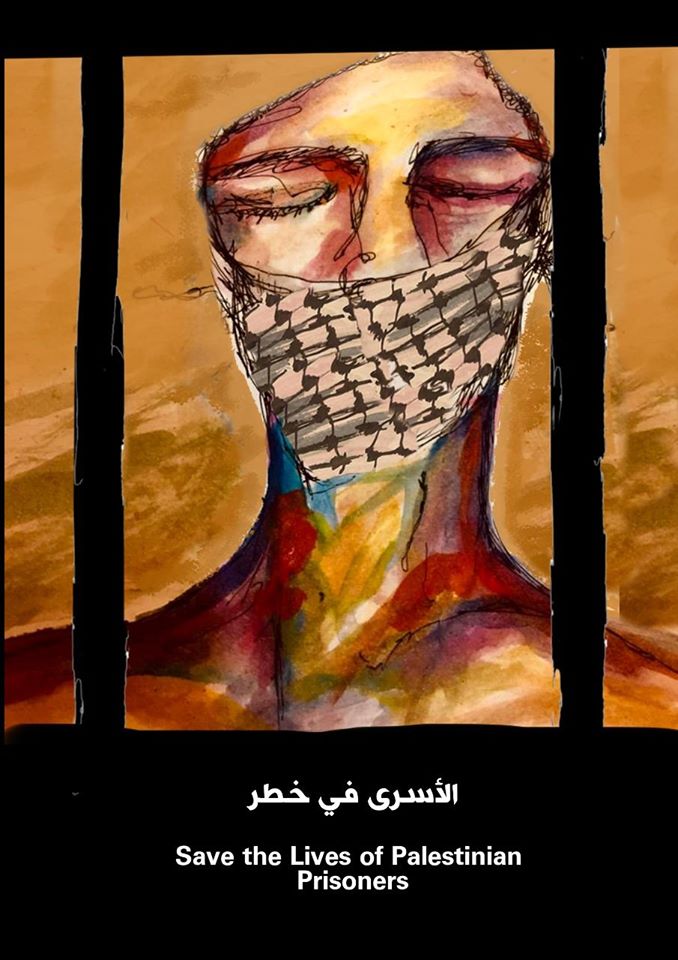

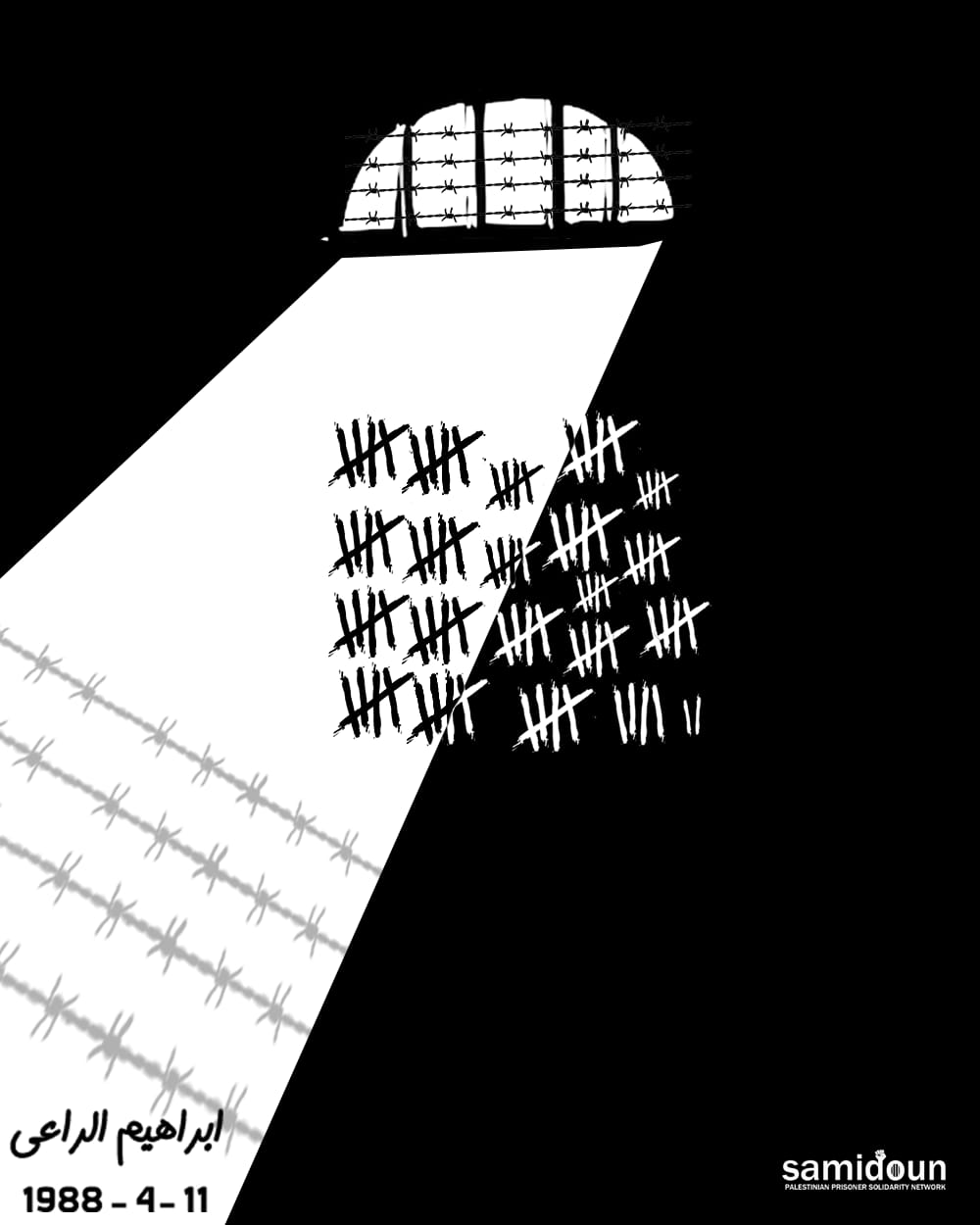

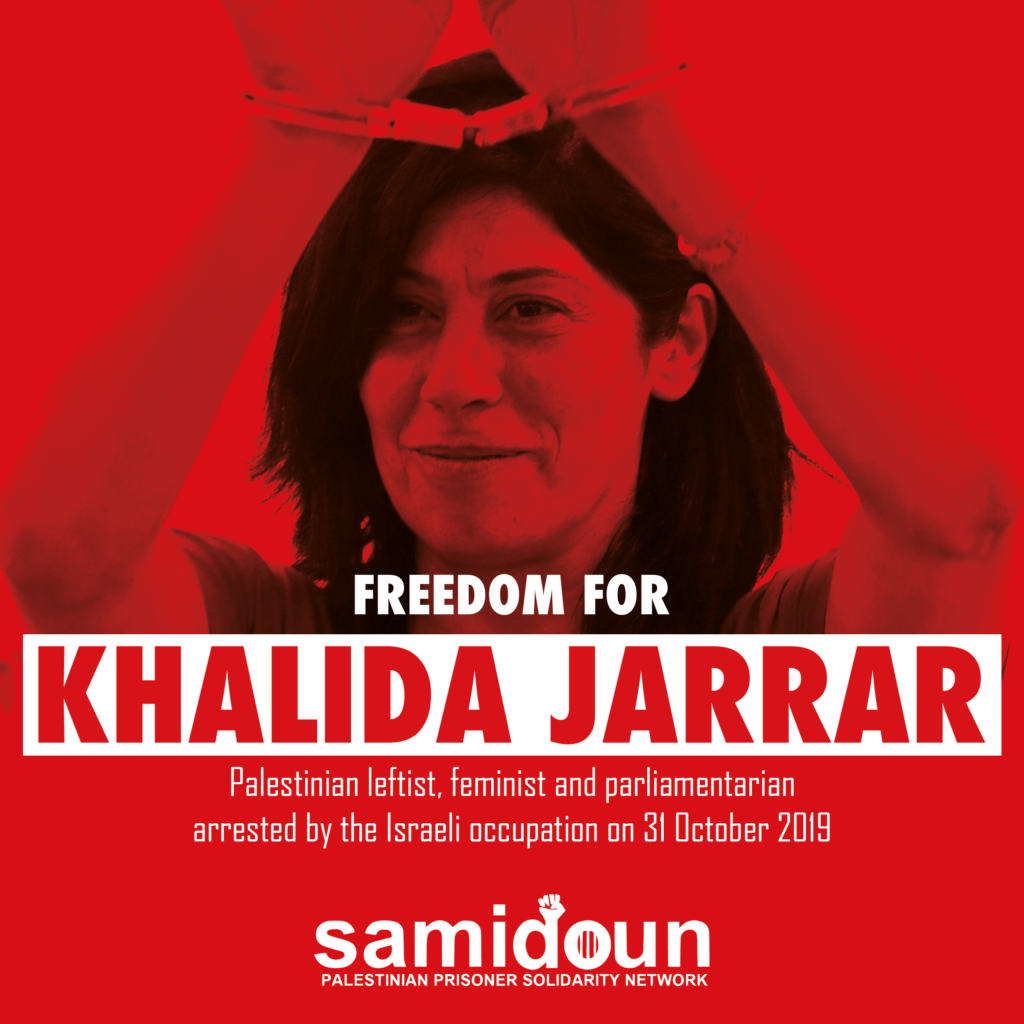
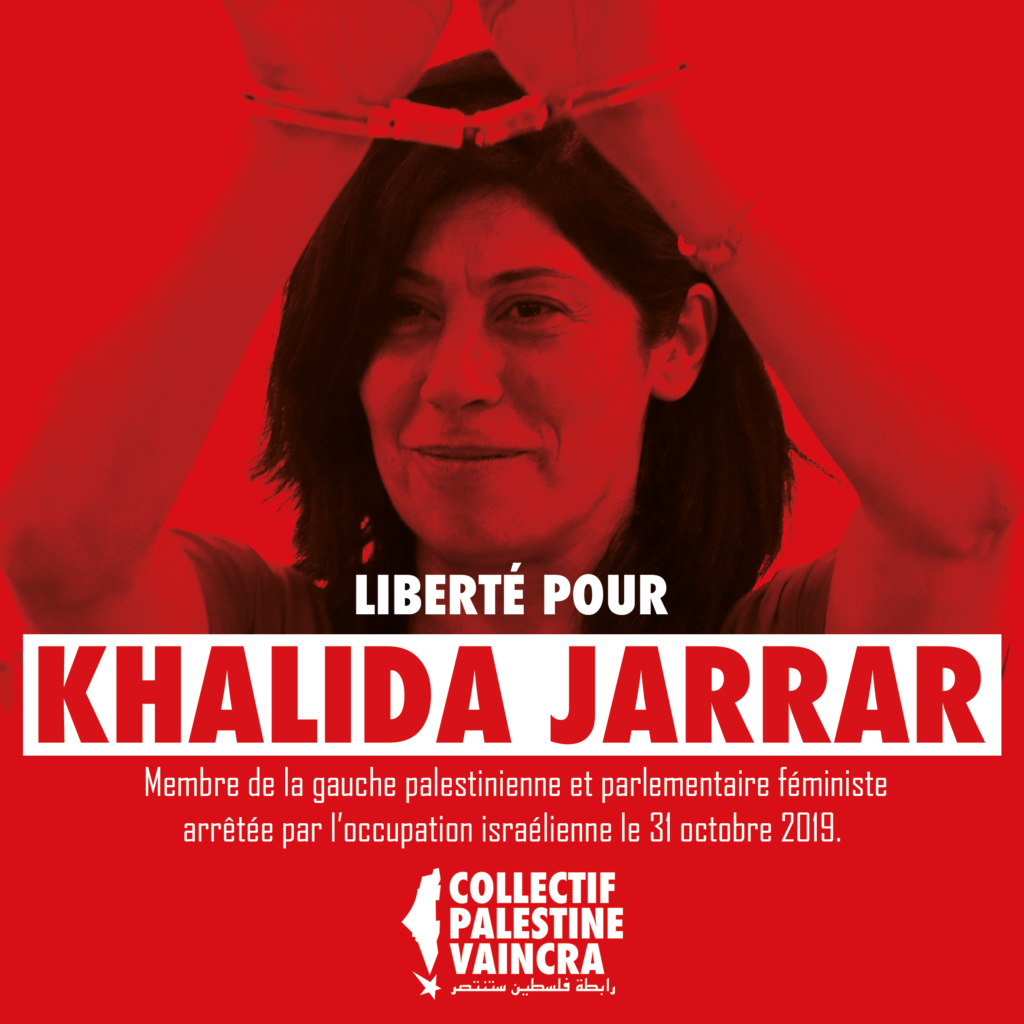
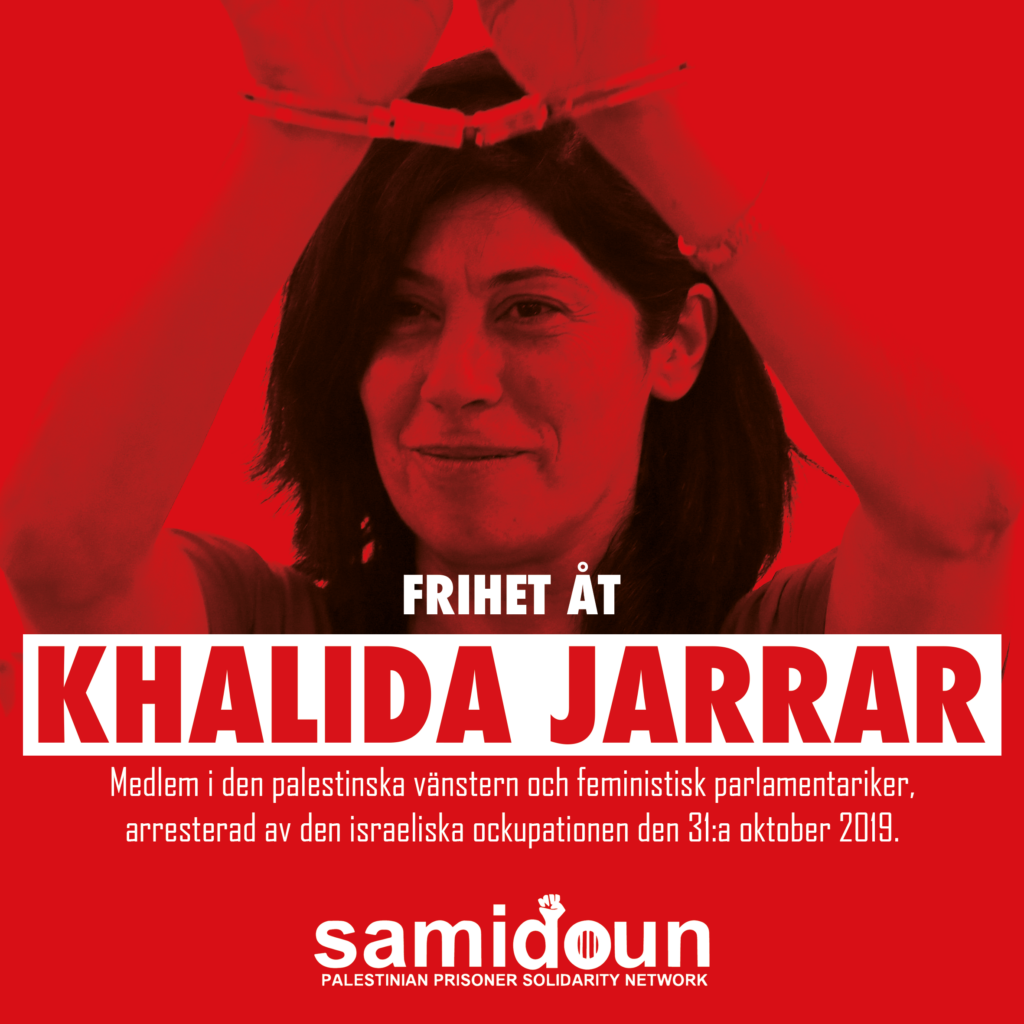
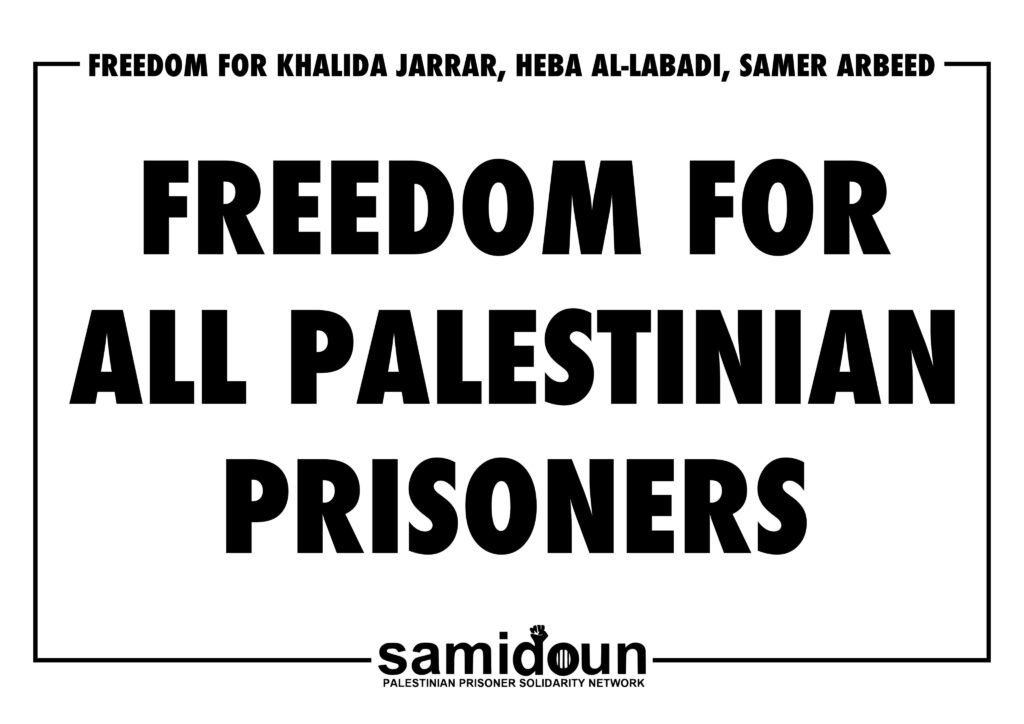
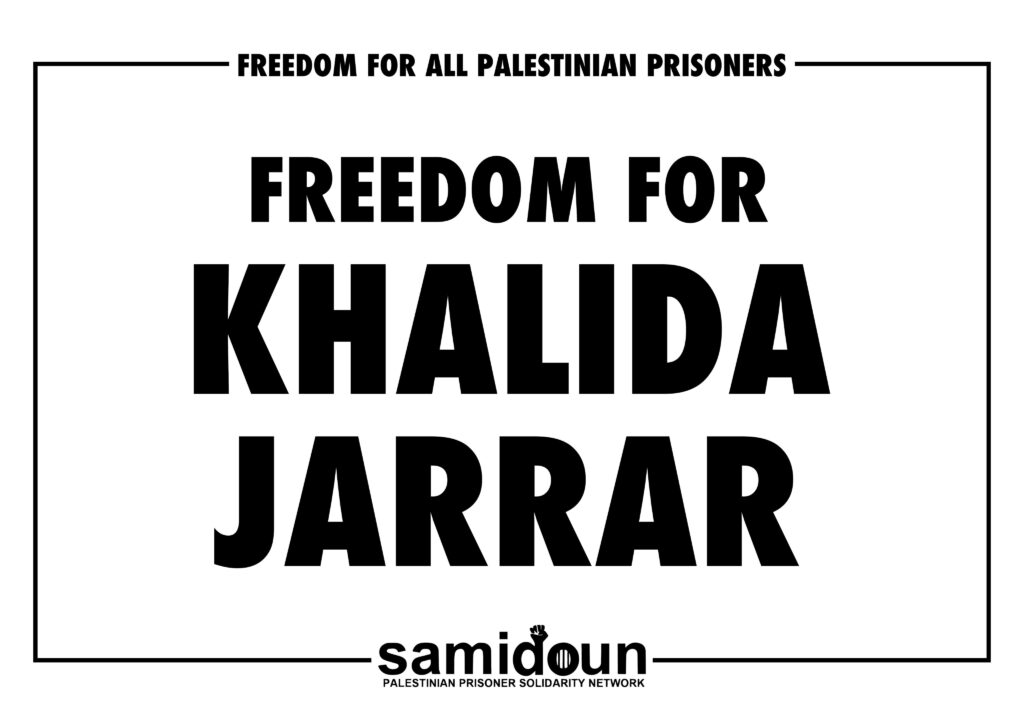
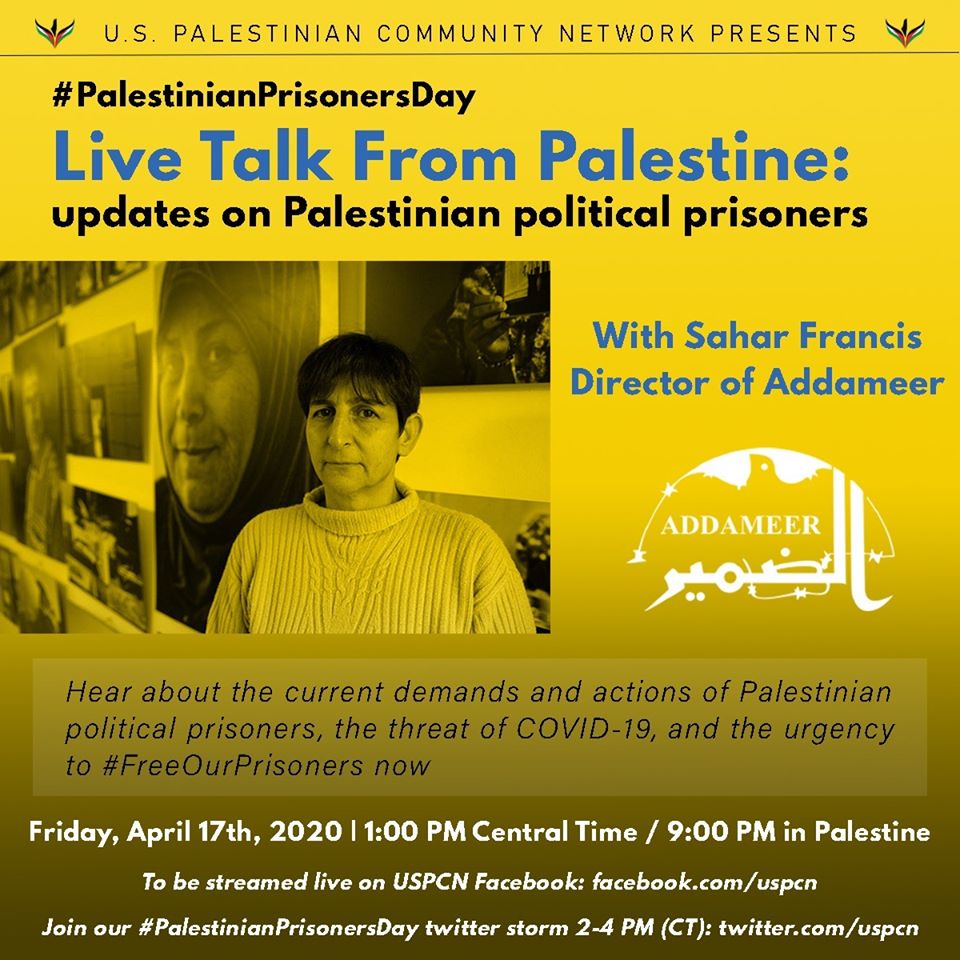 On Friday, April 17th, 2020, the U.S. Palestinian Community Network (USPCN) and the entire world will mark the International Day of Solidarity with Palestinian Political Prisoners. Join us on the 17th at 1 PM Central / 2 PM Eastern / 9 PM in Palestine for a special live teach-in with Sahar Francis, Director of Addameer Prisoner Support and Human Rights Association, the most important political prisoner advocacy institution in Palestine.
On Friday, April 17th, 2020, the U.S. Palestinian Community Network (USPCN) and the entire world will mark the International Day of Solidarity with Palestinian Political Prisoners. Join us on the 17th at 1 PM Central / 2 PM Eastern / 9 PM in Palestine for a special live teach-in with Sahar Francis, Director of Addameer Prisoner Support and Human Rights Association, the most important political prisoner advocacy institution in Palestine.